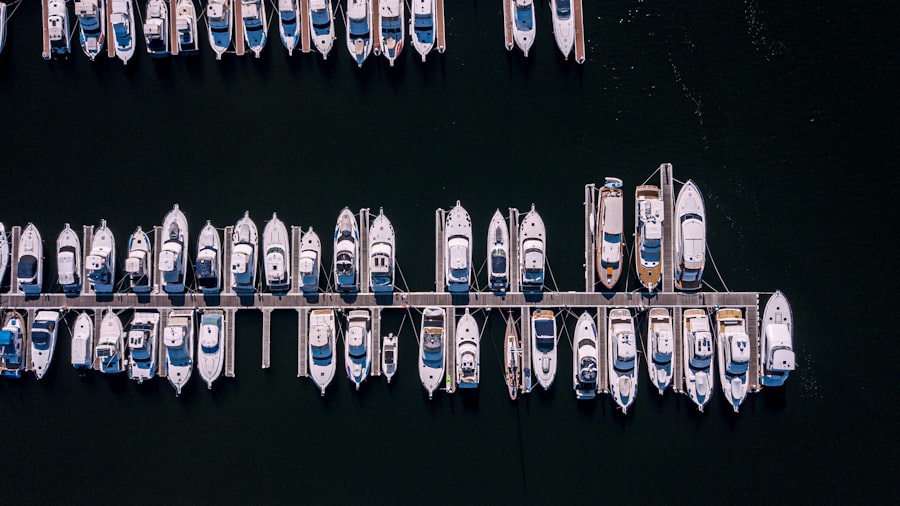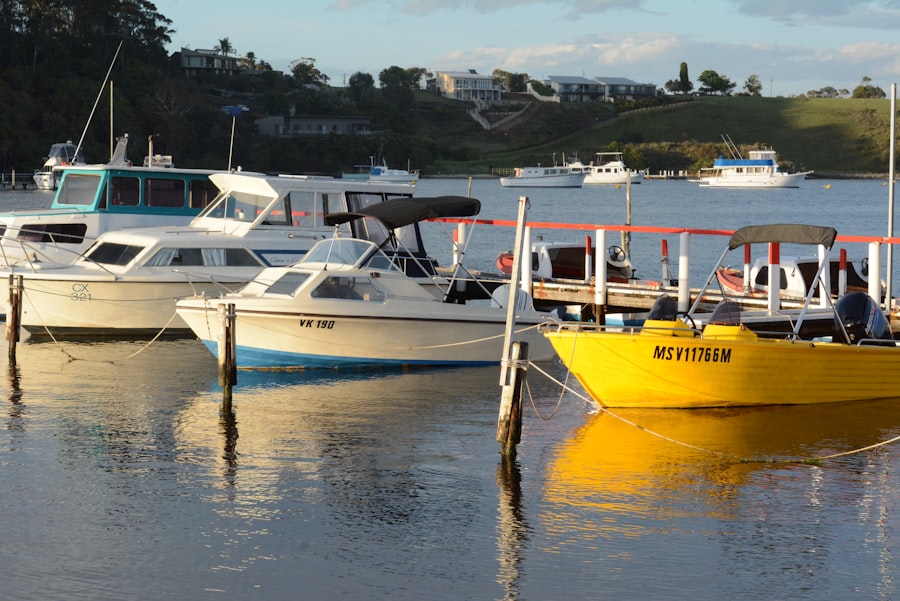Pontoon boats have gained immense popularity over the years, primarily due to their versatility and spaciousness. These vessels are characterized by their flat, buoyant design, which typically consists of two or more pontoons that provide stability and support. This unique structure allows for a wide range of activities, from leisurely cruising on calm lakes to hosting family gatherings and fishing excursions.
The design of pontoon boats has evolved significantly, with modern models featuring luxurious amenities such as comfortable seating, sunbathing areas, and even kitchens or bars. This adaptability makes them an attractive option for families and recreational boaters alike. When considering a pontoon boat, it is essential to understand the various types available on the market.
There are basic models designed for simple day trips, while others are equipped with high-performance engines and advanced technology for water sports enthusiasts. Additionally, pontoon boats can vary in size, accommodating anywhere from a small group of friends to larger parties. The choice of materials used in construction also plays a crucial role in durability and maintenance.
Aluminum is a common choice due to its lightweight nature and resistance to corrosion, while fiberglass offers a sleek aesthetic but may require more upkeep. Understanding these distinctions will help potential buyers make informed decisions tailored to their specific needs.
Key Takeaways
- Gain a clear understanding of pontoon boat features and types before purchasing.
- Explore local dealerships and online marketplaces to compare options and prices.
- Use classified ads and network with local boat owners to find potential deals.
- Attend boat shows and expos to see various models and gather expert advice.
- Weigh the pros and cons of new versus used boats and carefully evaluate financing choices.
Researching Local Dealerships
Once you have a solid grasp of what a pontoon boat entails, the next step is to research local dealerships that specialize in these vessels. Visiting dealerships allows prospective buyers to physically inspect the boats, assess their features, and consult with knowledgeable sales staff. Local dealerships often provide a range of models from various manufacturers, giving buyers the opportunity to compare options side by side.
Additionally, many dealerships offer test drives, which can be invaluable in determining how a particular model handles on the water. In addition to visiting physical locations, it is wise to explore the online presence of local dealerships. Many have websites that showcase their inventory, complete with detailed specifications and pricing information.
Online reviews can also provide insight into the dealership’s reputation and customer service quality. Engaging with local boating communities through social media platforms can yield recommendations for reputable dealerships as well. By gathering information from multiple sources, buyers can ensure they are making a well-informed choice when selecting a dealership to work with.
Online Marketplaces for Pontoon Boats

In today’s digital age, online marketplaces have become a significant resource for purchasing pontoon boats. Websites such as Boat Trader, Craigslist, and eBay offer extensive listings of both new and used pontoon boats from private sellers and dealers alike. These platforms allow buyers to filter their searches based on various criteria, including price range, location, and specific features.
This level of customization makes it easier for potential buyers to find a boat that meets their unique requirements without having to visit multiple dealerships. One of the advantages of using online marketplaces is the ability to access a broader range of options than what might be available locally. Buyers can explore listings from different states or even countries, which can lead to discovering rare models or better deals.
However, it is crucial to exercise caution when purchasing through these platforms. Conducting thorough research on the seller’s credibility and requesting detailed photographs or videos of the boat can help mitigate risks associated with online transactions. Additionally, arranging for an independent inspection before finalizing any purchase is advisable to ensure that the boat is in good condition.
Utilizing Classified Ads
| Metric | Description | Typical Value | Notes |
|---|---|---|---|
| Response Rate | Percentage of inquiries or contacts received per ad posted | 5% – 15% | Varies by category and ad quality |
| Cost per Ad | Average cost to place a classified ad | 10 – 50 | Depends on platform and ad length |
| Conversion Rate | Percentage of responses that lead to a sale or desired action | 1% – 5% | Improves with targeted ads and clear calls to action |
| Ad Duration | Typical length of time an ad remains active | 7 – 30 days | Longer durations may increase visibility |
| Click-Through Rate (CTR) | Percentage of viewers who click on the ad link | 2% – 10% | Higher for online classified ads |
| Audience Reach | Estimated number of people viewing the ad | 1,000 – 50,000 | Depends on platform popularity and category |
Classified ads remain a traditional yet effective method for finding pontoon boats for sale. Local newspapers and online classified platforms like Craigslist or Facebook Marketplace often feature listings from individuals looking to sell their boats directly. This approach can sometimes yield better prices since sellers may be more willing to negotiate without the overhead costs associated with dealerships.
Furthermore, classified ads can provide access to unique or vintage pontoon boats that may not be available through mainstream channels. When browsing classified ads, it is essential to be diligent in your search. Pay attention to the details provided in each listing, including the boat’s age, condition, and any modifications made by previous owners.
It is also beneficial to reach out to sellers with specific questions about maintenance history or any issues that may not be immediately apparent in the ad. Setting up appointments for viewings can help buyers assess the boat in person and gauge whether it meets their expectations. As with online marketplaces, conducting due diligence is key to ensuring a successful transaction.
Networking with Local Boat Owners
Networking with local boat owners can be an invaluable resource when searching for a pontoon boat. Engaging with fellow boating enthusiasts can provide insights into the best places to buy boats, as well as recommendations for trustworthy sellers. Local boating clubs or associations often host events where members gather to share experiences and advice about boating-related topics.
These gatherings can serve as excellent opportunities to connect with seasoned boaters who may have leads on available pontoon boats or know someone looking to sell. Additionally, social media platforms have made it easier than ever to connect with local boating communities. Joining groups dedicated to boating in your area can facilitate discussions about pontoon boats and provide access to listings shared by members.
Many boat owners are passionate about their vessels and are often willing to share their knowledge about maintenance, upgrades, and where to find good deals. By tapping into these networks, prospective buyers can gain valuable insights that may not be readily available through traditional sales channels.
Attending Boat Shows and Expos

Boat shows and expos are excellent venues for anyone interested in purchasing a pontoon boat. These events typically feature a wide array of boats from various manufacturers, allowing attendees to explore different models all in one location. Boat shows often include interactive displays where potential buyers can board the vessels, examine their features up close, and even participate in demonstrations of their capabilities on the water.
This hands-on experience is invaluable for understanding how different models feel and perform. Moreover, boat shows frequently host seminars and workshops led by industry experts covering topics such as maintenance tips, safety regulations, and boating best practices. Attending these sessions can enhance your knowledge about pontoon boats and help you make informed decisions during your purchasing journey.
Additionally, many manufacturers offer special promotions or discounts during boat shows, making it an opportune time to negotiate prices or secure financing options that may not be available elsewhere.
When deciding between new and used pontoon boats, several factors come into play that can significantly influence your choice. New pontoon boats come with the latest technology and features, often backed by warranties that provide peace of mind regarding potential repairs or issues down the line. Buyers can customize new models according to their preferences, selecting specific colors, layouts, and additional amenities that suit their lifestyle.
However, this luxury comes at a price; new boats typically require a larger financial investment compared to used ones. On the other hand, purchasing a used pontoon boat can offer substantial savings while still providing access to quality vessels. Many used boats are well-maintained and come equipped with desirable features that may have been added by previous owners.
However, buyers must exercise caution when considering used options; it is crucial to conduct thorough inspections and obtain maintenance records whenever possible. Understanding the boat’s history can help identify any potential red flags that could lead to costly repairs in the future.
Evaluating Financing Options
Financing is an essential aspect of purchasing a pontoon boat that many buyers must consider carefully. Various financing options are available depending on individual circumstances and preferences. Traditional bank loans are one route; they typically offer competitive interest rates but may require substantial down payments and good credit scores for approval.
Credit unions often provide favorable terms for members looking to finance recreational vehicles like boats. Another option is dealer financing, where dealerships partner with financial institutions to offer loans directly to customers at the point of sale. This method can streamline the purchasing process but may come with higher interest rates compared to traditional loans.
Additionally, some manufacturers offer promotional financing deals during specific periods that can make purchasing new boats more affordable. It is essential for buyers to evaluate all available financing options carefully, considering factors such as interest rates, loan terms, and monthly payment amounts before making a decision that aligns with their financial situation. In conclusion, navigating the process of purchasing a pontoon boat involves understanding various aspects of these vessels, researching local dealerships and online marketplaces, utilizing classified ads effectively, networking with fellow boat owners, attending relevant events like boat shows, weighing the pros and cons of new versus used options, and evaluating financing avenues thoroughly.
Each step plays a crucial role in ensuring that prospective buyers make informed decisions tailored to their needs and preferences while enjoying the exciting journey of becoming pontoon boat owners.


